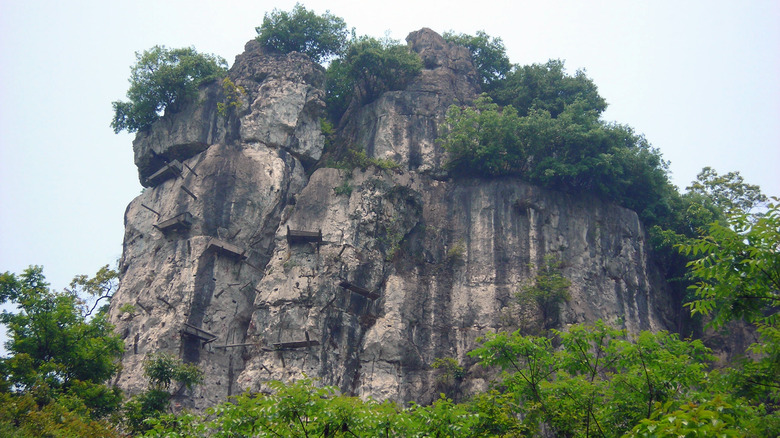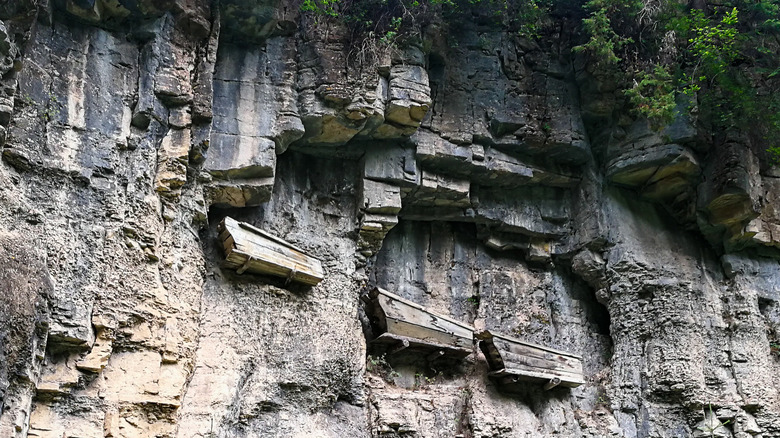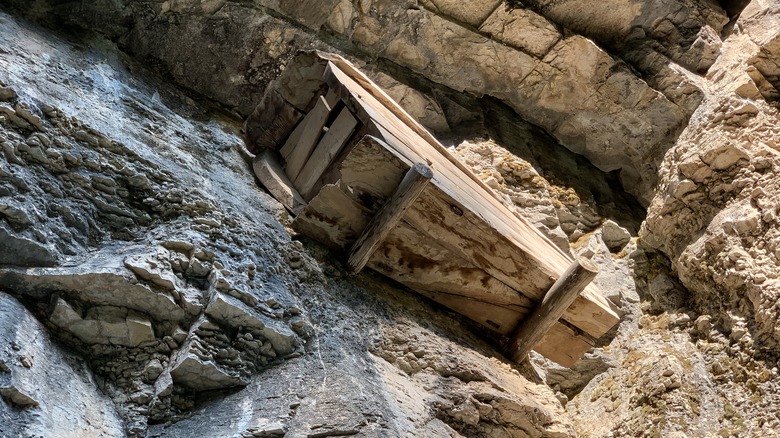Hanging Coffins: The Remaining Memory Of The Bo People Of China
Burial customs and death rituals have evolved over the millennia and vary from culture to culture. Common — but not strictly limited — to the Bo people of China, the practice at one time was to elevate coffins or place them at high points of elevation with the remains of the dead inside. The Bo people — a small indigenous population that once flourished in parts of the modern-day Sichuan and Yunnan Chinese provinces — lived in the 14th to late 17th centuries, and were practically wiped out in the Ming Dynasty, per CNN.
Some scholars think members of the Chinese Bo people escaped persecution and were assimilated into Chinese populations surviving today. The oldest high-altitude coffins discovered in the Fujian province of China are some 3,000 years old. Those clusters are now referred to as "hanging coffins," and as recently as 2015, in the Hubei province of China, more than 100 previously unknown examples were discovered.
Wherever hanging coffins are spotted, no one is quite sure how they got to such high places. Similarly, for the ancient people who put them there, there's uncertainty what the elaborate ritual may have meant.
The first major study of Chinese hanging coffins took place in the 1940s
As Paths Unwritten reports, the first study to examine the hanging coffins of the Chinese Bo people took place in 1946, though non-Chinese references to the coffins date from the 1930s. Almost all hanging coffin discoveries have been made in central China. Many additional studies and expeditions to study the sites where they're found have taken place since then. Evidence of hanging coffins also exists in Thailand, and the practice persisted in areas of the Philippines until recently.
The Chinese people native to the areas where archaeological hanging coffins have been uncovered speak of stories passed down for generations. One explanation says that affluent He families, with rumored Bo ancestry, were told if their ancestors hung their dead at high elevations they believed their descendants would prosper. Today, though, hanging coffins are considered bad luck. Writings from the Tang dynasty suggest the higher the coffin, the more profound the display of family wealth.
Still, other theories proffer that hanging the dead rather than burying their coffins kept the remains safe from scavengers. Valuables have also been found or have fallen from inside the caskets, suggesting those interred were prominent members of Bo society. Remains of multiple people have been found inside them, and the practice of hanging coffins may have simply kept valuable land clear for farming.
Hanging coffins don't exactly 'hang'
What's also notable, the mysterious hanging coffins of the Bo people don't hang so much as they are placed in caves, on man-made stakes and platforms, or arranged in naturally-occurring rock crevices. Some evidence suggests that bodies were first buried before they were relocated to the cliff sides and caves. There's similar uncertainty as to how the caskets got to where they rest. One theory posits they were lowered over the side of the cliff rather than raised from below.
Others contend elaborate scaffolding must have been used in the process. Just like what the ritual meant, it's similarly unclear in terms of logistics, how the heavy wooden caskets ended up where they remain to this day. Considering the weight of the ancient coffins, Hong Kong explorer Wong How Man, who studies the Bo people's hanging caskets, told CNN: "They must have known they would eventually fall down." With evidence of modern looting, efforts are now underway in China to study and preserve these cultural sites ( via China.org).
Offering perhaps the best insight into what hanging coffins may have meant, Chinese leader and writer Li Jing of the Tang Dynasty, who died in 1382 wrote in his "Brief Chronicles of Yunnan." (via China.org): "Coffins set high are considered auspicious. The higher they are the more propitious for the dead. And those whose coffins fell to the ground sooner were considered to be more fortunate."


